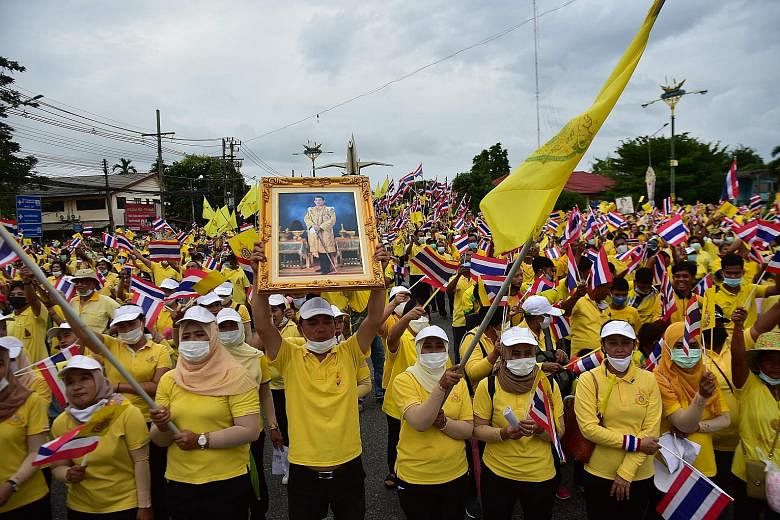BANGKOK • #KingKeepFighting was the hashtag used by the embattled Thai Prime Minister's operations centre at the weekend on a Twitter post with pictures of a walkabout by King Maha Vajiralongkorn.
Faced with protesters' calls for Prime Minister Prayut Chan-o-cha to quit and the monarchy's biggest challenge in decades, the royalist establishment is showing signs of attempting to mobilise a counterattack.
The palace has been silent through months of anti-government protests that have increasingly aimed at the monarchy. But on Thursday, the King made a sign of support for former junta leader Prayut and on Saturday, lauded a royalist demonstrator who had defied protesters.
His supporters took heart. "Politicians, leaders of enemies of the King - are you ready to flee the Kingdom of Thailand? Your time is almost up," Mr Rienthong Nanna, the leader of an ultra-royalist vigilante group, threatened on Facebook at the weekend.
The protests at first targeted Mr Prayut before demanding the monarchy's powers be curbed too. Demonstrations only grew bigger after a week of tough emergency measures to end them.
With Mr Prayut still the main target for protesters, the king lit the fire at the cremation of his father last Thursday, nine months after he died.
Then on Saturday, in a widely publicised moment, he expressed encouragement for a man who had defied protesters, telling him: "Very brave, very good, thank you."
Thais read the signals. "The King just left no doubt. He's in this fight and he's backing his royalist-nationalist supporters against the pro-democracy youth movement," said Dr James Buchanan, a lecturer at Bangkok's Mahidol University International College.
Ms Nattabhorn Juengsanguansit, a partner at Asia Group Advisors, a government affairs consultancy, said the king's "actions signal a closer-knit and more aligned establishment".
"There is heightened tension and a risk of clashes. If the situation worsens, the government could use it as a pretext for a heavier hand," she said.
A danger sign flared last week when a few dozen yellow-shirted royalists scuffled with students at the Ramkhamhaeng University, claiming victory when the students backed off with one hurt.
Thais remember a decade of street clashes between royalist yellow shirts and red shirt followers of populist leader Thaksin Shinawatra - trouble Mr Prayut used to justify seizing power in 2014.
Some royalist leaders have disavowed violence. For them, defending the monarchy is not political because the monarchy is above politics.
Mr Rienthong, however, characterised the scuffle at the university as normal and said support was growing for tougher action. "If there is more violation of the monarchy... loyalists will not stand by and will not hesitate to escalate violence,"he told reporters.
Anti-government protesters, stressing a non-violent approach, are concerned. "Some of them really hate us," said protest leader Jutatip Sirikhan.
Police, who intervened at the university, say they will treat everyone fairly and stop violence.
The number of royalist events has been rising, with almost daily rallies now, from barely any a month ago. So far, those in Bangkok have largely drawn at most a few hundred people compared to tens of thousands at the anti-government protests.
Outside Bangkok, there have been signs of greater mobilisation, with thousands gathering in yellow shirts, although sometimes the crowds also include state employees.
Many Thais are worried what comes next. A poll by the National Institute of Development Administration found nearly 60 per cent of Thais feared violence between the rival groups or through the intervention of other parties.
REUTERS

